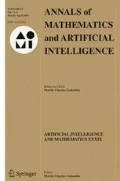Abstract
This paper is concerned with a sufficient condition under which a concept class is learnable in Gold’s classical model of identification in the limit from positive data. The standard principle of learning algorithms working under this model is called the MINL strategy, which is to conjecture a hypothesis representing a minimal concept among the ones consistent with the given positive data. The minimality of a concept is defined with respect to the set-inclusion relation – the strategy is semantics-based. On the other hand, refinement operators have been developed in the field of learning logic programs, where a learner constructs logic programs as hypotheses consistent with given logical formulae. Refinement operators have syntax-based definitions – they are defined based on inference rules in first-order logic. This paper investigates the relation between the MINL strategy and refinement operators in inductive inference. We first show that if a hypothesis space admits a refinement operator with certain properties, the concept class will be learnable by an algorithm based on the MINL strategy. We then present an additional condition that ensures the learnability of the class of unbounded finite unions of concepts. Furthermore, we show that under certain assumptions a learning algorithm runs in polynomial time.
Similar content being viewed by others
References
Angluin, D.: Finding patterns common to a set of strings. J. Comput. Syst. Sci. 21(1), 46–62 (1980)
Angluin, D.: Inductive inference of formal languages from positive data. Inf. Control. 45(2), 117–135 (1980)
Angluin, D.: Inference of reversible languages. J. ACM 29(3), 741–765 (1982)
Arimura, H., Shinohara, T., Otsuki, S.: A polynomial time algorithm for finding finite unions of tree pattern languages. In: Proceedings of the Second Internaitonal Workshop on Nonmonotonic and Inductive Logic, LNAI 659, pp. 118–131. Springer (1993)
Arimura, H, Shinohara, T, Otsuki, S: Finding minimal generalizations for unions of pattern languages and its application to inductive inference from positive data. In: Enjalbert, P., Mayr, E., Wagner, K. (eds.) STACS 94, Lecture Notes in Computer Science, vol. 775, pp. 647–660. Springer, Berlin (1994)
Gold, E.M.: Language identification in the limit. Inf. Control. 10(5), 447–474 (1967)
Jain, S., Ng, Y.K., Tay, T.S.: Learning languages in a union. J. Comput. Syst. Sci. 73, 89–108 (2007)
Kobayashi, S.: Approximate identification, finite elasticity and lattice structure of hypothesis space. Tech. rep., Technical Report CSIM 96-04, Dept. of Compt. Sci. and Inform. Math., Univ. of Electro-Communications (1996)
Laird, P.D.: Learning from good and bad data. Kluwer Academic Publishers, Norwell (1988)
Lassez, J.-L., Maher, M.J., Marriott, K.: Unification Revisited. Foundations of Deductive Databases and Logic Programming, 587–625 (1988)
Lehmann, J., Hitzler, P.: Concept learning in description logics using refinement operators. Mach. Learn. 78(1-2), 203–250 (2010)
Motoki, T., Shinohara, T., Wright, K.: The correct definition of finite elasticity: corrigendum to identification of unions. In: Proceedings of the fourth annual workshop on Computational learning theory, COLT ’91, p 375. Morgan Kaufmann Publishers Inc., San Francisco (1991)
Ng, Y.K., Shinohara, T.: Inferring unions of the pattern languages by the most fitting covers. In: ALT, pp. 269–282 (2005)
Okayama, T., Yoshinaka, R., Otaki, K., Yamamoto, A.: A sufficient condition for learning unbounded unions of languages with refinement operators. In: ISAIM (2014)
Ouchi, S., Yamamoto, A.: Learning from positive data based on the MINL strategy with refinement operators. In: Proceedings of the 2009 international conference on New frontiers in artificial intelligence, JSAI-isAI’09, pp. 345–357. Springer, Berlin (2010)
Plotkin, G.D.: A note on inductive generalization. Mach. Intell. 5, 153–163 (1970)
Reidenbach, D.: A non-learnable class of E-pattern languages. Theor. Comput. Sci. 350(1), 91–102 (2006)
Sakakibara, Y., Yokomori, T., Satoshi, K.: Keisanronteki Gakushuuriron (in Japanese. Computational Learning Theory). Baifukan (2001)
Shapiro, E.Y.: Inductive inference of theories from facts. Research Report YALEU/DCS/RR-192,Yale University (1981)
Shinohara, T., Arimura, H.: Inductive inference of unbounded unions of pattern languages from positive data. Theor. Comput. Sci. 241(1), 191–209 (2000)
Takami, R., Suzuki, Y., Uchida, T., Shoudai, T.: Polynomial time inductive inference of TTSP graph languages from positive data. IEICE Trans. 92-D(2), 181–190 (2009)
Wright, K.: Identification of unions of languages drawn from an identifiable class. In: Proceedings of the second annual workshop on Computational learning theory, COLT ’89, pp. 328–333. Morgan Kaufmann Publishers Inc., San Francisco (1989)
Author information
Authors and Affiliations
Corresponding author
Additional information
Okayama and Ouchi have left Kyoto University
Rights and permissions
About this article
Cite this article
Ouchi, S., Okayama, T., Otaki, K. et al. Learning concepts and their unions from positive data with refinement operators. Ann Math Artif Intell 79, 181–203 (2017). https://doi.org/10.1007/s10472-015-9458-6
Published:
Issue Date:
DOI: https://doi.org/10.1007/s10472-015-9458-6




